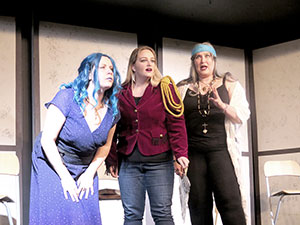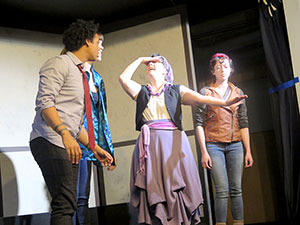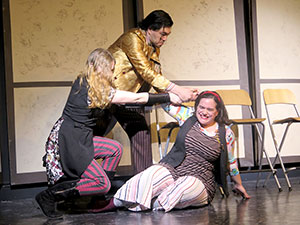
The play “Interview with a Gorgon” by Greg Lam, was performed at the “Giving@First” theater festival on January 11.
By Shira Laucharoen
Mack Carroll would be writing the play in one night. He said he would most likely be considering several different outlines and test out genres such as science fiction and fantasy. The play would probably use a prop, a silver hand mirror, as a focal point to build a story around. “I’m ready to stay up all night,” said Carroll. “I’m looking forward to it.”
These were Carroll’s ideas at the onset of the opening planning meeting for community theater organization Theatre@First’s festival in one day, Giving@First. During the festival, writers, directors, and actors would produce and rehearse seven original ten-minute plays in the span of 24 hours, culminating in a performance on January 11.
Carroll was one of nine playwrights participating in the show, which was led by festival director Mike Haddad. Proceeds from the production went to ALS One, an organization aiming to find a breakthrough treatment for Lou Gehrig’s disease.

“Three and a Mirror” by Mack Carroll.
Fifty participants met the evening of January 10 for the festival’s kick off meeting, during which they were assigned to one of the seven teams. Names were drawn from a lottery, determining which artists would be working together. The timer was set at 9:22 p.m., as cheers erupted and a drumroll filled the room.
The plays did involve a set of rules: each one would have to find a way to use the silver hand mirror and a stool as props, and each would have to incorporate a specific line of dialog, “But where are we going to find an ice bucket?”
After being delegated to a team, the artists broke into their individual groups for quick meetings, where they tossed around ideas. Writers went home to develop their plays in the course of a night, turning them in to their directors and actors by 7:00 in the morning.
Directors and actors were welcome to use the rehearsal space at the Unity Somerville church for an hour per play, though many continued to workshop their pieces at their homes. Finally, the seven new plays were performed Saturday night, finishing the festival with 16 minutes to spare.
This year marks the fourth time Theatre@First has put together a festival in one day. Haddad had brought up the idea in 2017, as a way of providing relief to hurricane survivors, wanting to use theater to make an impact and activating the power of art. Haddad said that he was drawn to the concept that “constraint breads creativity,” that artists could develop some of their most original work when facing the pressure of the clock.
“From an acting and directing standpoint, live theater always has that wonderful little bit of danger, because anything can happen,” said Haddad. “There’s a way that gets amplified when you have twelve hours to write a new script. I feed off of that energy.”
The festival opened with a comical play, Raising the Stakes, by Naomi Hinchen, which centered on a group of vampires holding a meeting, only to find that their

“When Stars Align” by Tofer Carlson.
victim actually intends to slay them. In Interview with a Gorgon, by Greg Lam, the poet Ovid converses with Medusa, a character who turns men to stone if looked upon directly. Episode 47: The Haunted Mirror, by Amanda Owens and Steven Owens, humorlessly featured a man narrating a ghostly experience from his life to a man adapting his story for the screen. The evening ended with Who Killed Mike Haddad?, by Hatem Adell and artistic director of Theatre@First Elizabeth Hunter, during which an investigator accused all on stage of being suspects for a murder.
Hunter said that the framework of the festival and the frenetic pace often produce unique results. The format also gives playwrights the opportunity to generate work for a specific cast, as they craft their roles around the actors assigned to their teams, responding to the qualities they bring. Theater typically has its own constraints, said Hunter, as artists “work in local spaces that aren’t built as theaters, have day jobs, and have a limited budget.” Giving@First is an extreme example of the conditions they frequently face, she said.
“Putting us under tight pressure can really inspire us to do some of our best work,” Hunter said. “You can’t second guess yourself or say, ‘I’ll sleep on it overnight and see if the dialog sounds good in the morning.’ Whatever it is, we have to go with it. Whatever seems funny now, we’re going to make it happen, and the result is really good theater because of that.”

“Auld Lang Syne” by Michael Saenz.

 https://www.portersquarebooks.com/
https://www.portersquarebooks.com/













Reader Comments